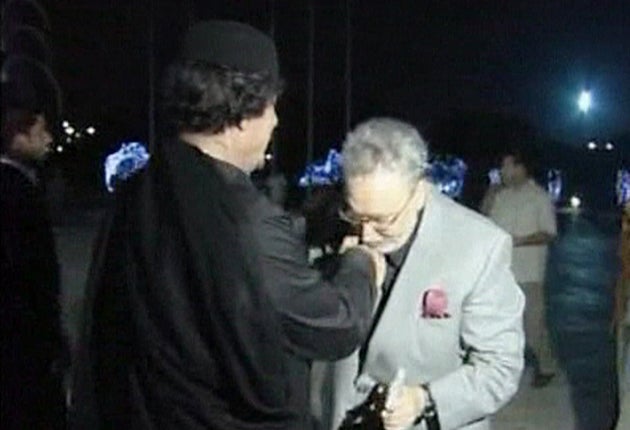'Ministerial visits' to Libya in the spotlight

Your support helps us to tell the story
From reproductive rights to climate change to Big Tech, The Independent is on the ground when the story is developing. Whether it's investigating the financials of Elon Musk's pro-Trump PAC or producing our latest documentary, 'The A Word', which shines a light on the American women fighting for reproductive rights, we know how important it is to parse out the facts from the messaging.
At such a critical moment in US history, we need reporters on the ground. Your donation allows us to keep sending journalists to speak to both sides of the story.
The Independent is trusted by Americans across the entire political spectrum. And unlike many other quality news outlets, we choose not to lock Americans out of our reporting and analysis with paywalls. We believe quality journalism should be available to everyone, paid for by those who can afford it.
Your support makes all the difference.Pressure increased on Gordon Brown today to disclose details of trade deals negotiated with Libya after it was reported that three ministers had visited the country in 15 months leading up to the release of the Lockerbie bomber.
Lord Jones, then trade minister, travelled to Libya in May last year to speak to business representatives, according to reports.
Former health minister Dawn Primarolo was said to have conducted talks with the Libyan prime minister in November last year, and Bill Rammell, then Foreign Office minister, held discussions with his Libyan counterparts in February 2009.
Home Secretary Alan Johnson also met Libyan health ministers at the World Health Assembly in Geneva last year when he was health secretary, it was reported.
The Libyan visits will add more fuel to the row over the freeing of the terminally ill Abdelbaset Ali Mohmed Al Megrahi on compassionate grounds.
Earlier this week, opposition parties said ministers had "serious questions" to answer after Libyan leader Colonel Muammar Gaddafi's son, Saif, claimed that the decision to release Megrahi was tied to a trade deal.
Business Secretary Lord Mandelson dismissed the suggestion that the bomber's case was on the table during talks as "offensive".
The Prime Minister has come under fire for his silence on whether he agrees with Scotland's Justice Secretary Kenny MacAskill's decision to release the man convicted of the 1988 terror attack on compassionate grounds.
Former deputy prime minister John Prescott yesterday became the first senior Labour figure to back Mr MacAskill's decision.
Asked in a Sky News interview if he had any objection to the decision to the release of Megrahi, Mr Prescott said: "No I don't have any objection.
"If the man is dying, if compassion is passed as it is in the Scottish administration, and the medical authorities then gave proof to that effect as they did, then it's a decision for their legal authority.
"You know Scotland has always had a great deal more independence in its legal authority going back many years so we have to respect that decision and I do."
His comments were immediately seized on by the Scottish National Party (SNP), who contrasted them with the stance of Labour in Scotland, and by Tories who said Gordon Brown should state his views on the release.
Justice Minister Jack Straw yesterday questioned whether Mr MacAskill should have visited Megrahi in jail before coming to a decision.
Mr Straw said: "That was his decision. If you are asking me if I have ever visited a prisoner in jail who has applied for compassionate release, the answer to that is no."
A YouGov poll for the Daily Mail revealed that support for Scottish independence has fallen in the wake of the furore over Megrahi's release.
The survey of 1,078 Scottish adults found only 28% back independence, down eight points in a year.
It also showed almost a third of Scots want Mr MacAskill to resign, while 70 per cent believe their reputation abroad has suffered.
Join our commenting forum
Join thought-provoking conversations, follow other Independent readers and see their replies
Comments